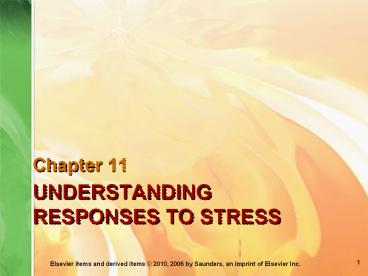UNDERSTANDING RESPONSES TO STRESS - PowerPoint PPT Presentation
Title:
UNDERSTANDING RESPONSES TO STRESS
Description:
Title: Chapter 011 Subject: Understanding Responses to Stress Author: Varcarolis Description: Foundations of Psychiatric Mental Health Nursing, 6/e – PowerPoint PPT presentation
Number of Views:82
Avg rating:3.0/5.0
Title: UNDERSTANDING RESPONSES TO STRESS
1
UNDERSTANDING RESPONSES TO STRESS
- Chapter 11
2
Stress
- A broad class of experiences in which a demanding
situation taxes a persons resources, or coping
capabilities, causing a negative effect
3
Early Stress-Response Theories
- Walter Cannon
- Fight-or-flight response
- Body prepares for situation that individual
perceives as threat to survival - New research indicates that men and women have
different neural responses to stress
4
Early Stress-Response TheoriesContinued
- Hans Selye
- General Adaptation Syndrome (GAS)
- Three stages
- Alarm or acute stress stage
- Resistance or adaptation stage
- Exhaustion stage
- Psychological reactions (Lazarus)
- Distress
- Eustress
5
Neurotransmitter Stress Responses
- Serotonin synthesis more active
- May impair serotonin receptor sights and brains
ability to use serotonin
6
Immune Stress Responses
- Interaction between nervous system and immune
system during alarm phase of GAS - Negatively affects bodys ability to produce
protective factors
7
Types of Conflict
- Approach-Avoidance
- Avoidance-Avoidance
- Vacillation
8
Mediators of the Stress Response
- Stressors
- Perception
- Personality
- Social support
9
Mediators of the Stress Response Continued
- Self-help groups
- Low- and high-quality support
- Culture
- Spirituality and religious beliefs
10
Nursing Management of Stress Responses
- Measuring stress
- Social Readjustment Rating Scale (Holmes and
Rahe 1967, 1978, 1997) - Measures level of positive and negative stressful
life events over a 1-year period - Assessing coping styles
11
Coping Strategies
- Seeking comfort
- Relying on self-discipline
- Intense expression of feeling
- Avoidance and withdrawal
- Talking it out
- Privately thinking it through
- Working it off
12
Coping Strategies - continued
- Engaging in self-healing and mind/body practices
- Spirituality and prayer
- Symbolic substitutes
- Somatizing
13
Behavior Stress-Management Techniques
- Bensons relaxation techniques
- Meditation
- Guided imagery
- Breathing exercises
14
Behavior Stress-Management Techniques Continued
- Physical exercise
- Progressive muscle relaxation
- Biofeedback
15
Cognitive Approaches to Stress Management
- Cognitive reframing
- Mindfulness
- Journaling
- Humor































